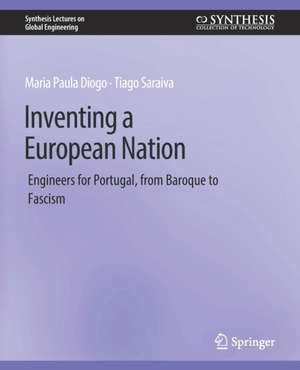Inventing a European Nation: Engineers for Portugal, from Baroque to Fascism: Synthesis Lectures on Global Engineering
Autor Maria Paula Diogo, Tiago Saraivaen Limba Engleză Paperback – 5 oct 2020
Preț: 220.43 lei
Nou
Puncte Express: 331
Preț estimativ în valută:
42.18€ • 44.04$ • 34.91£
42.18€ • 44.04$ • 34.91£
Carte disponibilă
Livrare economică 15-29 martie
Livrare express 01-07 martie pentru 22.54 lei
Preluare comenzi: 021 569.72.76
Specificații
ISBN-13: 9783031010019
ISBN-10: 3031010019
Pagini: 151
Ilustrații: VIII, 151 p.
Dimensiuni: 191 x 235 x 14 mm
Greutate: 0.29 kg
Editura: Springer International Publishing
Colecția Springer
Seria Synthesis Lectures on Global Engineering
Locul publicării:Cham, Switzerland
ISBN-10: 3031010019
Pagini: 151
Ilustrații: VIII, 151 p.
Dimensiuni: 191 x 235 x 14 mm
Greutate: 0.29 kg
Editura: Springer International Publishing
Colecția Springer
Seria Synthesis Lectures on Global Engineering
Locul publicării:Cham, Switzerland
Cuprins
Introduction.- Making Engineers Portuguese.- Engineering the Liberal State.- Engineers, Industrial Workers, and the Bourgeois City.- The Colonial Face of Portuguese Engineering.- The Modernist Engineer.- Engineering the Fascist New State.- Conclusion.- Authors' Biographies.
Notă biografică
Maria Paula Diogo is Full Professor of History of Technology and Engineering at the NOVA School of Sciences and Technology and member of CIUHCT - Interuniversity Centre of the History of Science and Technology. She publishes regularly in reputed international journals and publishers. She is a founding member of international research networks, organized numerous national and international conferences and workshops and participates in international H2020 projects. Her most recent co-authored book, Europeans Globalizing: Mapping, Exploiting, Exchanging (Palgrave Macmillan 2016) is part of the Making Europe: Technology and Transformations book series, which was awarded the Freeman Prize by the European Association for the Study of Science and Technology. She recently co-edited the volume Gardens and Human Agency in the Anthropocene (Routledge, 2019). Her research in history of science and technology brings together topics such as globalization, circulation and appropriation of expertise, networks, centers and peripheries and more recently the concept of Anthropocene. In 2020 she was awarded the Leonardo da Vinci Medal, the highest recognition from the Society for the History of Technology.Tiago Saraiva is an Associate Professor of History at Drexel University, coeditor of the journal History and Technology, and author of Fascist Pigs: Technoscientific Organisms and the History of Fascism (2016), winner of the 2017 Pfizer Prize awarded by the History of Science Society. He recently coedited Capital Científica (Imprensa Ciencias Sociais, 2019) and Nature Remade (University of Chicago Press, 2021). His work intersects history of science and technology, political history and global history





